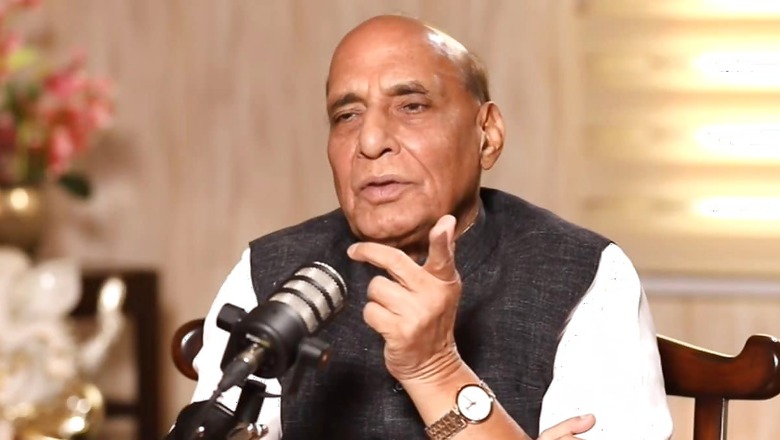
views
Defence Minister Rajnath Singh has sharpened his attack against the Congress party over the Emergency of 1975 imposed by then prime minister Indira Gandhi. In an interview with news agency ANI, Singh turned emotional, saying he could not even attend his mother’s last rites after she died due to brain haemorrhage because he was in jail at that time.
“I was not given parole to attend my mother’s last rites during the Emergency, and now they call us dictators. I could not even meet her during her final days when she was admitted in the hospital for 27 days. I got my head tonsured in jail after her death but couldn’t get to go for her last rites,” Singh said, responding to allegations by the Congress and its allies that the central government had resorted to “tanashahi“, or dictatorship.
The news agency released a video clip of the excerpt on Singh talking about Emergency from the ANI interview.
#WATCH | ”I was not given parole to attend my mother’s last rites during the Emergency, and now Congress call us dictators,” Defence Minister Rajnath Singh reveals the untold story of the 1975 Emergency. pic.twitter.com/cvgoQ0KMoi— ANI (@ANI) April 11, 2024
“People who imposed dictatorship through Emergency are accusing us of dictatorship,” he added, according to the promo. Singh also explained how he was arrested at that time for “raising awareness about Emergency”.
When asked about the entire experience, Singh said that he was 23 when he was arrested and was put in solitary confinement. “We didn’t get any books to read. We were just given a bowl of dal and roti (bread) in our hands. They used to let us move around the compound for some time and then put us back in the solitary cell,” Singh said.
When asked if he thought that this would end in three months or one year, he replied saying when he was being transferred to Central Jail, his mother had come to meet him and told him not to apologise no matter what happens. “The police people started crying when that happened,” he said.
This is not the first time that Singh has hit out at the Congress over Emergency. Last month, speaking at the NDTV Defence Summit, Singh had called Emergency a ‘black chapter’ in the history of India. He said that apart from Emergency, there were no curbs on the freedom of Press in India.
“In the history of democracy of this country, if we set aside the dark chapter of the Emergency, there can never be seen any restriction on the freedom of the press,” Singh said.
“Articles were read before being published, headlines were determined from a party’s headquarters. And for opposing the government, journalists were sent to jail also. Not just jail, as I myself have been in jail during the Emergency, (many) journalists were even harassed,” he had said.
“If we leave aside that dark period (of Emergency), then whether our government or governments led by any other party, everyone has maintained the freedom of the press,” Singh added.
A national emergency was declared in India from 1975 to 1977 by then President Fakhruddin Ali Ahmed on the advice of then Prime Minister Indira Gandhi. It is known as the period during which press freedom was curtailed and several opposition leaders were arrested.




















Comments
0 comment